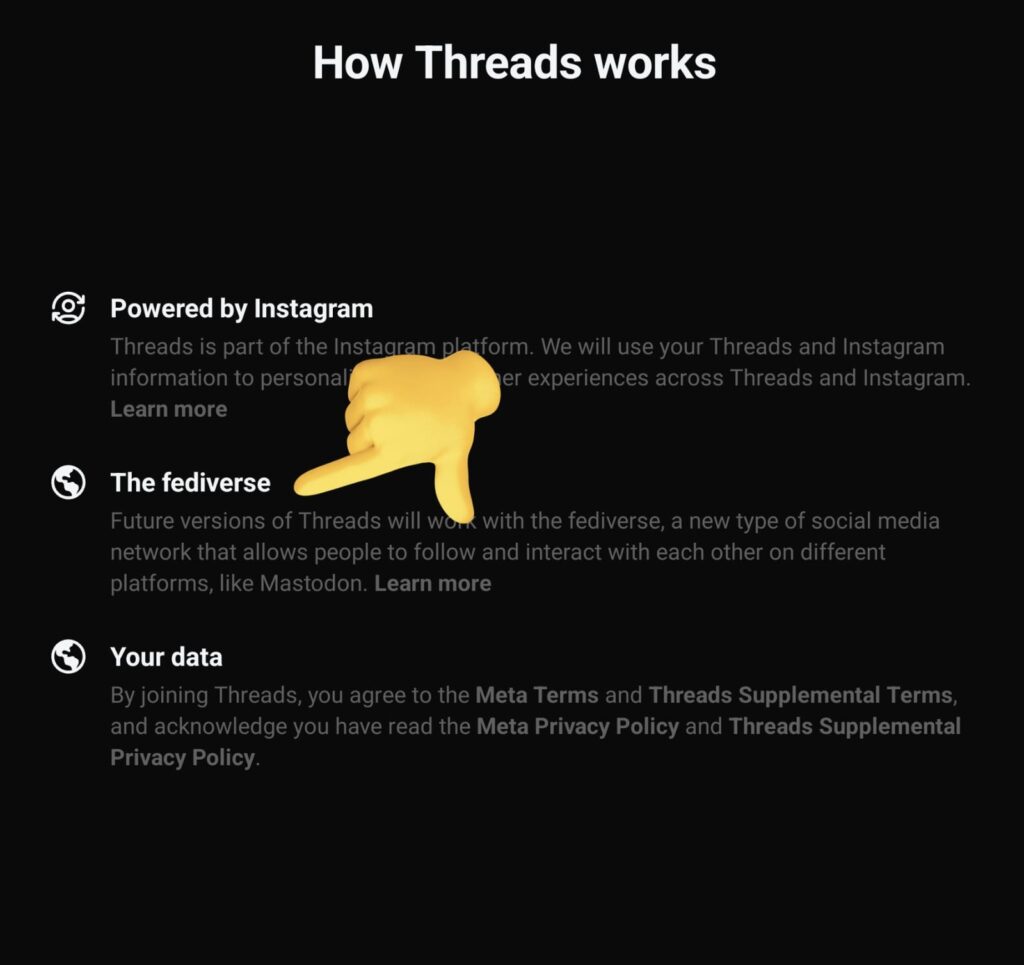In a matter of of hours Meta’s new Twitter-esque social media app Threads filled with millions of users, cresting 50M accounts within a couple days of launch and putting the fediverse on the map. Back on Twitter conversations raged about the future of both apps, with some wondering out loud if Threads would fatally wound Musk’s $44B investment. This binary framing- the idea that there will be a singular “winner”- may be a great way to incentivize user adoption, but runs counter to the megatrend of the moment-diffusion- which suggests there will likely be many more platforms like Threads and far more “winners”. In the increasingly diffuse, multipolar landscape of the future the proverbial pie gets cut into many more slices and user value grows in proportion to a shrinking platform market cap. In the version of the future I hypothesize here, tokenization emerges as a crucial content management tool that helps organize an increasingly atomized social media landscape, where platforms become commoditized and creators emerge more powerful than ever. Let’s travel through the tokenized social media space and examine how the fediverse will alter the internet!
Friendster, MySpace, Facebook
Early social applications were nearly singular in their hegemony, rising and falling in dynastic fashion; Friendster was overcome by MySpace, which was dethroned by Facebook. In each period the dominant app sucked all the energy from rivals and vanquished competition. There simply wasn’t a notion of maintaining multiple accounts across platforms simultaneously because crucial critical mass existed in one ecosystem, creating content was too time consuming to duplicate or triplicate across communities, and each app’s unique formatting made the idea of scaling content distribution in the post-industrial sense functionally impossible. In this world the user was gifted the privilege of using the platform, the audience aggregating tool of the time, in exchange for her contributions to the platform- the very content that made that platform valuable. The effects of scale and cross-platform user friction created a monopoly, which in a lower-tech world where the development dollars necessary to build and maintain such a platform started in the 9-figure range, coerced users into accepting this bargain. Times have changed. Platforms are not so expensive to spin up, micro-communities are surging and creators are demanding more control. Enter the Fediverse.

Fediverse; the social media multiverse
The fediverse can be thought of as a “content adapter”. It takes the standard components of social media posts- text, an image, a user handle or a video- along with the various activities of all social media platform users- post, repost, like, share- and standardizes them so they can be shared across any platform in the federation. So if they were members of the fediverse, a video posted to YouTube could be shared on Twitter with one click, and users on each platform would be totally unaware where the content originated. The content would format and behave as if ecosystem native, and the content creator could publish across any number of platforms simultaneously. This not only has the advantage of providing increased reach and more efficient scaling, it derisks the effects of deplatforming- a scourge that threatens to cripple any creator at any time for potentially no reason at all or altogether terrible reasons. This is a clear, decisive victory for creators and indicates a shift away from monopolistic social platforms.
Why did Threads join the fediverse?
Threads launched promising future inclusion in the fediverse. Given that Threads parent co Meta already boasts more users across its social platforms than any other social media company, it was under no market pressure to cooperate with the fediverse. On the surface it may seem Meta stands to lose the most by participating- so why did Zuckerberg make the decision to join the federation? I can reasonably speculate his decision was driven by:
1. Regulation: You’ve perhaps noticed I used the word “monopoly” here a couple times? as the debate rages regarding whether Twitter is a utility or not, it’s helpful to recall how utilities have been historically treated. In particular, recall the period of mobile telephony when networks like Verizon “owned” customers cell phone numbers. If you wanted to switch networks, you lost your mobile number, which informed the extremely low frequency of network switching in cellular’s early days. Today our @handles and social media graph is being held hostage in the same way. Zuck has a much warmer relationship with regulators than Musk and I suggest here he knows intimately what’s coming, and the fediverse (or similar) will become a legal requirement of platforms soon.
2. Advertiser Capture: Facebook and Instagram have among the most sophisticated existing advertiser technology and an enormous advertiser base that ranges from Fortune 500s to SMBs and individual users. Advertising is where the dollars are in social media platforms, and there’s a better chance Meta will take the lion’s share both on and off platform through federation of content then lose any revenue whatsoever. You can think of this as the Associated Press of social content for them. They’ll get more supply of content Meta is better equipped to monetize through advertising. In short, Meta really has nothing to lose and much to gain.
3. Public Relations: This is a spectacular coup in the realm of public discourse. Zuck has positioned his Meta as creator-favorable as opposed to Musk, who’s insistence he is a “Free speech Warrior” will ring hollow if Twitter rejects the fediverse, a tool which clearly increases the velocity and reach of speech. Musk’s approach will be rightly viewed not as free speech increasing, but rather speech monopolizing. Under this fact set if Twitter can resist regulation, it will become the home of “expensive speech”.
4. Fork Attack on Twitter: If Twitter enters the Fediverse, twitter dominant users will cross publish to Threads, Mastadon, Instagram and Facebook, to name a few. Since Meta owns the largest marketshare of social platforms this will necessarily disproportionately benefit Meta. If Twitter doesn’t, it will experience decreased usage and suffer from the public perception it is behaving monopolistically, and may in fact fall under regulatory scrutiny. Twitter is under a classic fork attack.
Where Does Tokenization Feature?
So where does tokenization fit into all this? Everywhere. Let’s start with the UX.
Fast forward a few years. The fediverse is bustling, niche platforms are spinning up left and right, content is liberated from the shackles of proprietary schemas. Content consumers are now traveling all over the internet and logging into distinct platforms to consume and publish content, all with different handles, psuedonyms, anon accounts and business accounts. The password keeping is a chore, the metadata being captured is invasive, and the primary means to communicate with the customer is likely an email address- itself subject to censure, destruction or loss. Tokenization provides a way users can hold various platform credentials that enable discrete behavior anonymously without the need for existing and invasive social media oauths. Users can also be rewarded for their patronage and republishing of content, either through perks, airdrops privileged access to content or entry into real world events. Tokenized, anonymous online and offline identity is a safer, more secure and enjoyable user experience that allows for the effortless financialization of content. “Financialization” may sound dystopian to you, but as content becomes increasingly valuable, the idea of users not participating fully in its value extraction will seem far more obscene.
Then there’s the content creators; they want to own their graph nose to tail. Rather than simply federate the distribution of their work, they want to be able to take their entire body of work, all their users, all the consumption data and statistics, and move it whenever and wherever they wish. Tokenization allows for each post and its itinerant parts to be individually monetized, sold or hypothecated. This day will surely come, and tokenization is the most efficient framework to manage the economic, operational and qualitative attributes of content creation and distribution. Lastly tokenized data itself is verified and transparent in this ecosystem architecture, which means performance can also be built into behaviors governed by smartcontracts. Advertisers can program these ad spends to move algorithmically with realtime, verified data, driving more value to creators and their sponsors. Most importantly, the consummate control offered by tokenization makes symmetrical a user versus platform power dynamic that has skewed towards platforms for two decades, and which is now equalizing. With tokenization we see a transparent and honest accounting for intellectual property, identity and compensation that drives fairness and equity. Lastly, we can also look at the blockchain as the fediverse for behavior, or the secondary effects of federated content. By standardizing the recording and capture of user behavior on-chain, we make more uniform the whole of the digital content ecosystem, opening new doors for further collaboration and content extension into places that may become common in the future- like metaverses. Obviously Meta is already thinking along these lines, and tokenization will feature in their strategy. Don’t forget Facebook was once pretty focused on Libra, which became Diem (Facebook Coin) before being unceremoniously dispatched to the dustbin. They were early, too early frankly, but knew the day would come where tokenization would drive ecosystem value- and they will return to that strategy soon.
Ill be writing more on this soon and am currently working with groups to realize this vision. If you’d like to learn more please follow, share and feel free to. reach me directly on any platform to discuss.





